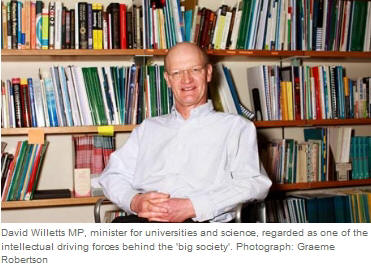
|
|
|
|
|
|
|
News & Views item - March 2011 |
![]() UK's Arts and Humanities Research Council and the "Big Society". (March 29,
2011)
UK's Arts and Humanities Research Council and the "Big Society". (March 29,
2011)
Termed the "Big Society" it formed part of Britain's Conservative Party manifesto. It's defined as aiming "to create a climate that empowers local people and communities, building a big society that will 'take power away from politicians and give it to people."
According to the Observer's Daniel Boffey: "Academics will study the "big society" as a priority, following a deal with the government to secure funding from cuts."
This is the result of the UK's coalition government "clarifying" the 90-year old Haldane principle – a convention that has protected the right of academics to decide where research funds should be spent. Under what might now be called the Humpty-Dumpty revision, research bodies must work to the government's national objectives, although the Department for Business, Innovation and Skills said that ministers will not meddle in individual projects. Nevertheless it is believed in UK academic circles that the Arts and Humanities Research Council (AHRC) was told that research into the "big society" was non-negotiable if it wished to maintain its funding at £100m a year, which might be termed a corollary of "Nixon's Law", i.e. "If you've got 'em by the financial balls, their minds, if not their hearts, will follow".
The director of research at Cambridge University's history faculty, Professor Peter Mandler, told the Observer that the AHRC was forced to accept the change by officials working for the minister for higher education, David Willetts, regarded as one of the intellectual driving forces behind the "big society".
Professor Mandler went on to say: "The government says they have rewritten the Haldane principle but they have junked it, basically. They say it is now their right to set the priorities for how this funding [is] distributed. They have got the AHRC over a barrel and basically told these guys that they cannot have their money unless they incorporate [these] research priorities. Willetts [David Willetts MP, minister for universities and science] was negotiating nominally, but the word is that it has come down from the secretary of state for business, innovation and skills, Vince Cable. Almost everyone who hears the story is upset about it. What about curiosity research, blue sky thinking? What is worrying is what won't be researched because of this."
Professor Colin Jones, president of the Royal Historical Society (RHS), said: "It seems to me to be absolutely gross. In a way, the AHRC should be congratulated for securing a good settlement in a difficult spending round, but there is something slightly ignoble about making the 'big society' a research priority. It is government money. They have the right to spend it on what they want, but there is a degree of anxiety about the strings being put on. They are being strengthened, which could be dangerous for independent research."
A principal at an Oxford college, who did not want to be named, told Mr Boffey: "With breathtaking speed, a slogan for one political party has become translated into a central intellectual agenda for the academy."
It is probable that the next meeting of the Oxford congregation, in May will take up the matter of the "imposition" of the "Big Society".
Gareth Thomas, Labour's shadow minister for higher education was scathing: "Vince Cable and David Willetts need to explain why he has allowed an ill-thought-out, half-formed Tory election idea to divert precious funding away from genuine research. When the government is axing virtually all the funding for the teaching of humanities, social sciences and the arts, wasting critical research monies on the 'big society' is simply unacceptable."
The Observer's Mr Boffey explains: "One of the tasks of research, according to the AHRC's delivery plan, will be to define "difficult to pin down" values [proclaimed] in "recent speeches on the big society", such as "fairness, engagement, responsibility, mutuality, individualism [and] selfishness".
Finely to demonstrate that arts and humanities academia have got it all wrong, a
Department for Business, Innovation and Skills spokesperson insisted that the
AHRC itself had proposed the "big society" as a strategic priority.
"Prioritisation of an individual research council's spending within its
allocation is not a decision for ministers," she added.
"The government supports [the Haldane] principle as vital for the protection of
academic independence and excellence."
And if there seems to be a whiff of Senator Carr's compacts with universities about all of this there is always particle physicist Brain Cox' 2008 counter observation, at least as far as the scientists are concerned: The notion that scientists will make a more valuable contribution to the economic and social wellbeing of the world if their research is closely directed by politicians is the most astonishing piece of nonsense I have had the misfortune to come across in a long time.